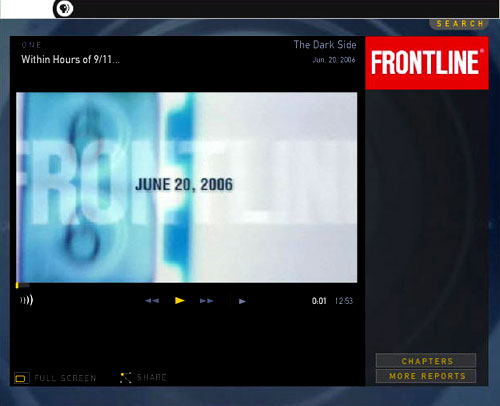
June 2006
from
PBS
Website
|
Investigating Vice President
Cheney's role as chief architect in the War on Terror and his
internal war with George Tenet's CIA... |
Amid revelations about faulty prewar
intelligence and a scandal surrounding the indictment of the vice
president's chief of staff and presidential adviser, I. Lewis "Scooter"
Libby, FRONTLINE goes behind the headlines to investigate the internal war
that was waged between the intelligence community and Richard Bruce Cheney,
the most powerful vice president in the nation's history.
"A lot of what needs to be done here will have to be done quietly, without
any discussion, using sources and methods that are available to our
intelligence agencies," Cheney told Americans just after 9/11.
He warned the
public that the government would have to operate on the "dark side."
In "The Dark Side," FRONTLINE tells the story of the vice president's role
as the chief architect of the war on terror, and his battle with Director of
Central Intelligence George Tenet for control of the "dark side."
Drawing on
more than 40 interviews and thousands of documents, the film provides a
step-by-step examination of what happened inside the councils of war.
Early in the
Bush administration, Cheney placed a group of allies throughout
the government who advocated a robust and pre-emptive foreign policy,
especially regarding Iraq. But a potential obstacle was Tenet, a holdover
from the Clinton administration who had survived the transition by bypassing
Cheney and creating a personal bond with the president.
After the
attacks on 9/11, Cheney seized the initiative and pushed for
expanding presidential power, transforming America's intelligence agencies
and bringing the war on terror to Iraq.
Cheney's primary ally in this effort
was Secretary of Defense Donald Rumsfeld.
"You have this wiring diagram that we all know of about national security,
but now there's a new line on it. There's a line from the vice president
directly to the secretary of defense, and it's as though there's a private
line, private communication between those two," former National Security
Council staffer Richard Clarke tells FRONTLINE.
In the initial stages of the war on terror, Tenet's CIA was rising to
prominence as the lead agency in the Afghanistan war.
But when Tenet
insisted in his personal meetings with the president that there was no
connection between Al Qaeda and Iraq, Cheney and Rumsfeld initiated a secret
program to re-examine the evidence and marginalize the agency and Tenet.
Through interviews with DoD staffers who sifted through mountains of raw
intelligence, FRONTLINE details how questionable intelligence was "stovepiped"
to the vice president and presented to the public.
From stories of Iraq buying yellowcake uranium from Niger to claims that
9/11 hijacker Mohamed Atta had met with an Iraqi agent in Prague, "The Dark
Side" dissects the now-familiar assertions that led the nation to war.
The
program also recounts the vice president's unprecedented visits to the CIA,
where he questioned mid-level analysts on their conclusions. CIA officers
who were there at the time say the message was clear: Cheney wanted evidence
that Iraq was a threat.
At the center of the administration's case for war was a classified October
2002 National Intelligence Estimate that found evidence of an Iraqi weapons
of mass destruction program. But Paul Pillar, one of the report's principal
authors, now admits to FRONTLINE that the NIE was written quickly in a
highly politicized environment, one in which the decision to go to war had
already been made.
Pillar also reveals that he regrets participating in
writing a subsequent public "white paper" on Iraqi WMD.
"What was the
purpose of it? The purpose was to strengthen the case for going to war with
the American public. Is it proper for the intelligence community to publish
papers for that purpose? I don't think so, and I regret having had a role in
it," Pillar says.
For the first time, FRONTLINE tells of George Tenet's personal struggle in
the run-up to the Iraq war through the accounts of his closest advisers.
"He, I think, asked himself whether or not he wanted to continue on that
road and to be part of it. And I think there was a lot of agonizing that
George went through about what would be in the best interest of the country
and national interest, or whether or not he would stay in that position and
continue along a course that I think he had misgivings about," says John
Brennan, former deputy executive director of the CIA.
Tenet chose to stay, but after the failure to find Iraqi WMD, the tension
between the agency and Cheney's allies grew to the point that some in the
administration believed the CIA had launched a covert war to undermine the
president.
In response, Cheney's office waged a campaign to distance itself
from the prewar intelligence the vice president had helped to cultivate.
Under pressure, Tenet resigned.
Cheney's chief of staff, Scooter Libby,
would later admit to leaking key sections of the NIE - authorized, he says,
by Cheney.
Libby also stated that the vice president told him that President
Bush had declassified the material. Insiders tell FRONTLINE that the leak
was part of the battle between the vice president and the CIA - a battle
that many believe has destroyed the CIA.
For video click below
image


